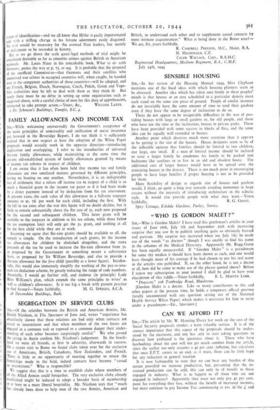SEGREGATION IN SERVICE CLUBS
Sts,—Of the relatiOns between the British and American Armies, Mr. Harold Nicolson, in The Spectator of June 2nd, writes "experience has abundantly shown that these relations are bad only when contacts are casual or intermittent and that when members of the two forces are engaged in a common task or exposed to a common danger their under- standing of each other becomes surprisingly cordial." We who passed the spring in Anzio confirm Mr. Nicolson's judgement. In the beach- head we were all friends, at first in adversity, afterwards in success. On a recent visit to Rome we found clubs taken over for the exclusive use of Americans, British, Canadians, New Zealanders, and French. There is little or no opportunity of meeting together to renew the friendships made in the field, indeed contacts have become " casual or intermittent." Who is responsible? We suggest that this is a time to establish clubs where members of 1 all the Allied Armies could foregather. The very exclusive clubs already established might be induced to adopt a broader basis of membership 1 or at least to a more liberal hospitality. Mr. Nicolson says that " much has already been done to help men of the two Armies, American and British, to understand each other and to supplement casual contacts by more intimate acquaintances." What is being done in the Rome area?— We are, Sir, yours faithfully, July 24th, 1944


























 Previous page
Previous page